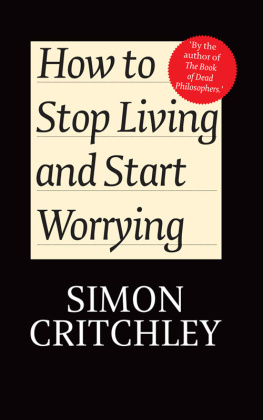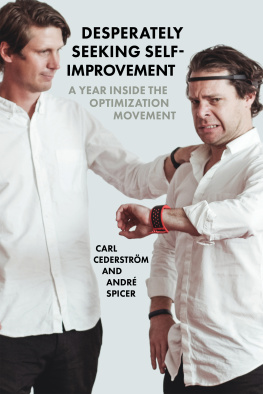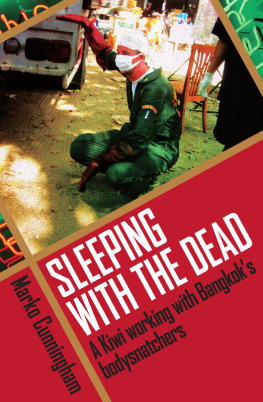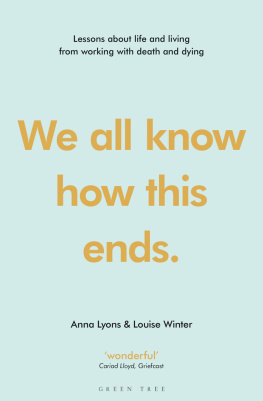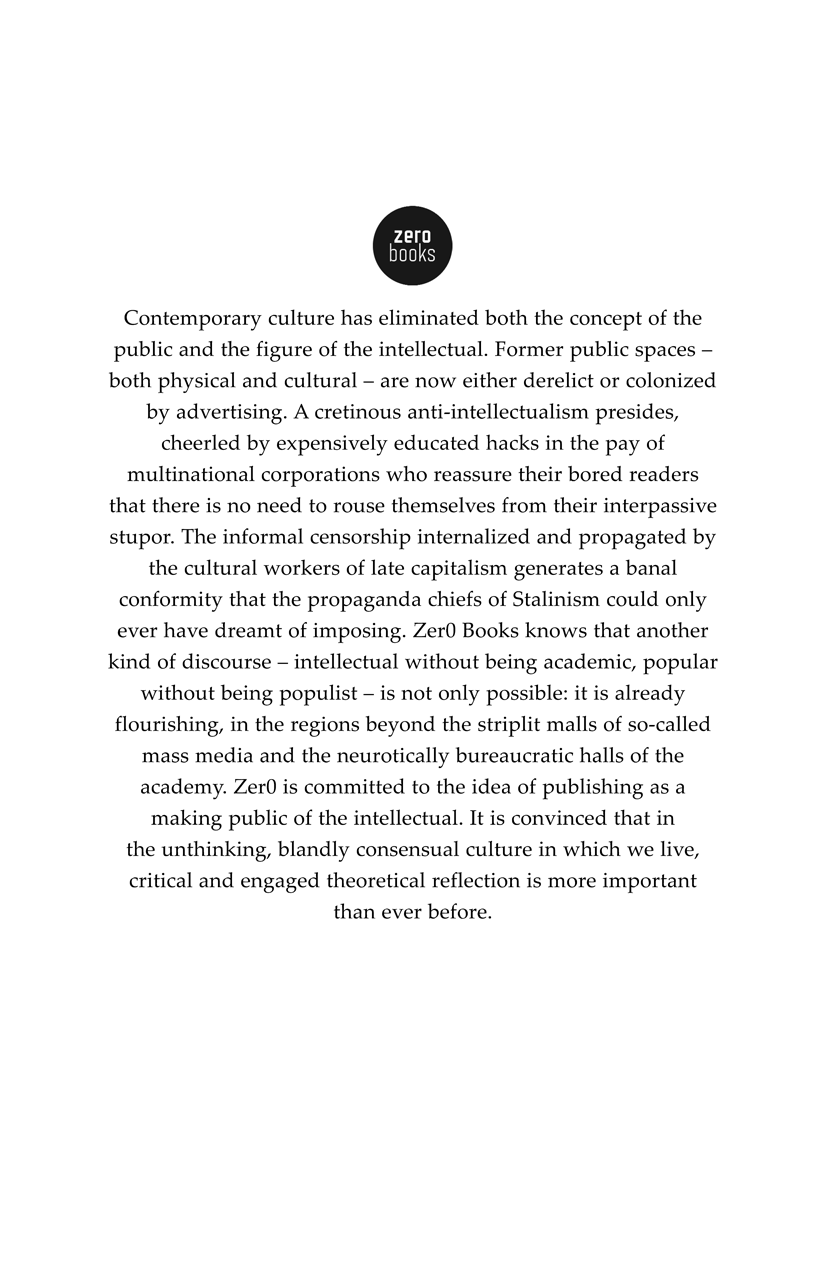Acknowledgment
We are grateful to Casper Hoedemeakers, Michael Marinetto and Andr Spicer for having read and commented on previous drafts of this book.
1
Dead Man Working
Even its most ardent supporters admit that capitalism died sometime in the 1970s. All attempts to resuscitate it failed. Yet strangely, now that its dead, its become the only game in town, more powerful and influential than ever. This book is about what it means to live and work in a dead world. A good place to begin is Franco Bifo Berardis dark YouTube lullaby Waiting for the Tsunami. In vivid prose that blends poetry with theory, and acute observation with art, he draws a desolate picture of our present condition. In a dying West rife with war, mental fatigue, financial atrophy and a mania for pointless work, we find our selves adrift, overwhelmed by nothing but a sense of emptiness and waiting. Bifo begins: before the tsunami hits, you know how it is? The sea recedes, leaving a dead desert in which only cynicism and dejection remain. What is truly petrifying is that something even worse is about to happen. But that is still to come. Meanwhile, we wander through this dying social architecture, slowly suffocating in a desert of extinct codes and inane loneliness. And then on the horizon, we see it. The wave! Although it is still some way off, its close enough to make our everyday concerns look absurd and futile. In light of the wave that will surely erase your existence, the command to work, procreate, consume, relax, be happy, be ethical, to obey in short, the command to live can now safely be ignored. As the wave draws closer, you feel strangely at ease. No more demands. All you need to do, Bifo concludes, is to make sure you have the right words to say, the right clothes to wear, before it finally wipes you away.
The dark awareness that is provoked by the incoming wave is further unpacked in Bifos The Soul at Work:
Breathing has become difficult, almost impossible: as a matter of fact, one suffocates. One suffocates every day, and the symptoms of suffocation are disseminated all along the paths of daily life our chances of survival are few: we know it. There is no alternative to capitalism.
The somatic desolation described here is grounded in a kind of hyper-hopelessness, an existence more properly defined by its opposite, that of non-living, a life that is already dead. After speaking with workers in a wide range of occupations, both at the top and bottom of the social hierarchy, we will argue in this book that this feeling of non-living is no more pervasive than among the multitude of workers trapped in the modern corporation. Whether in the office, the call center, the service counter, in the creative industries, the retail show-floor or the backroom warehouse, life seems to be far away. We have always known that capitalism accumulates numerical value by subtracting social value, experienced as alienation, disenchantment and dehumanization. But what has now become evident is the sheer pointlessness of our daily endeavors. A quest without end or rationale, slowly poisoning almost every aspect of our lives on the job and even afterwards when we think the daily grind is over. But, of course, it is never over. In an eccentric and extreme society like ours, working has assumed a universal presence a workers society in the worst sense of the term where even the unemployed and children find themselves obsessed with it. This viral-like logic of the corporation has even spread into our most intimate pastimes, precipitating a novel and inescapable cultural malaise, writ-large by a complete, irreversible and ominous dead end.
Bifos characterization of the living dead paralyzed before the wave is a telling reading of how we experience capitalism today. Most despise it for what it has made us become; yet we have no imaginative energy left to look beyond it. But this bleak parable does miss something important if we are to truly understand the mindset of the dead man working. In Bifos rendition, the metaphor of the incoming wave functions well only until the last instant, when it finally does arrive and wipe us away. Unfortunately our predicament is worse. What if that last instant never comes? What if the wave never arrives to end our misery? Perhaps this is the real tragedy underlining the dead man working. Even the hope of non-existence is snatched from us as we are hemmed into a manufactured dead end. We work as if we are about to die, as if we are about to be unburdened from the deadweight of work, but we never actually are until it is too late. Unlike past generations of workers who were told they either work or die on the scrapheap, it is not death that terrifies us today. We would welcome some terminus to relieve us from this living hell. No, what frightens us more than dying is the thought of not dying, being wedded to a life that is not worth living.
Perhaps this is the trouble with so many apocalyptic accounts of Western capitalism today, from Slavoj ieks compelling Living in the End Times to the strange popularity of the end-of the-world film Battle LA (which was also voted by many the worst movie of 2011). The expectation of some kind of end or conclusion may inadvertently feed into a seductive ideological distortion: the fantasy of release and escape. A fantasy that we might, for better or worse, someday be finished with all of this. The ideology of exit conceals, however, a mood that is now pervading large parts of our society. Yes, it is unbearable, but also, and paradoxically, unending. The Beckettian stuck-in-a-rut joke
Estragon: I cant go on like this.
Vladimir: Thats what you think.
has now become a way of life.
Much of this might be put down to the way work under capitalism has bloated into an inescapable totality, one which is universally loathed yet seemingly without any alternative. A suitable soundtrack to this impasse can be found in the laconic verse of the young Michel Houellebecq. Awaking from a troubled and lonely sleep, contemplating the drab commute to the central business district followed by yet another meaningless days work, the poet opines:
The morning. Explosions. Blue everywhere. Always blue; magnificent. The new day unrelenting. When will life be gentle? When will I be dead?
This is not simply the morose reverie of an overpaid, suicidal banker. The pathos of Houellebecqs poetry lies in the way it conveys the feeling that there is a fate far worse than death. From the daily tedium of the office, to the humiliating team building exercise, to the alienating rituals of the service economy, to the petty mind games of a passive-aggressive boss: the experience is not one of dying but neither of living. It is a living death. As Houellebecq recently said in an interview with the Paris Review: Entering the workforce is like entering the grave From then on, nothing happens and you have to pretend to be interested in your work. Although dead, we are nevertheless compelled to wear the exterior signs of life. Recognizing that workers at heart feel lifeless has prompted a new wave of managerial motivation techniques gleaned from the growing industry of self-help and new-age spirituality. The corporation now hires fun-sultants, whose job is to design puerile office games to make us laugh as we work ourselves to death. The now ubiquitous ideology of liberation management has realized that no one can exploit workers better than workers themselves (leave them alone and they will work forever). And the trend of injecting authenticity and other life affirming moments into work is a central facet of modern managerialism.


